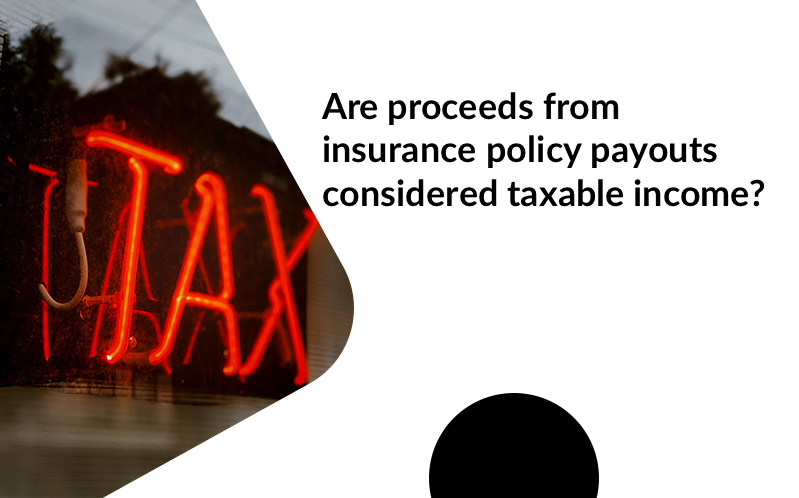Are proceeds from a life insurance policy payout considered taxable income?
It’s a very important question, both for the owner of the life insurance policy, who wants peace of mind that his family will be financially secure in the event of his passing away, and for the beneficiaries themselves, who need to know the amount of the proceeds should that situation arise.
Generally, life insurance proceeds you receive as a beneficiary are not taxed.
These proceeds are also not usually included in the gross income of the beneficiary, or in other words, the beneficiary doesn’t have to report them.
There is one exception, though. If you receive any interest, that interest is taxable, and you should report it as interest received. For example, if the insurance premiums of the policy owner are invested by the insurance company and, as a result, bear interest, this interest (and only the interest!) is taxable.
For example, if the life insurance policy is for $200k, and over the years it accumulated an additional $20k in interest, then the $20k (and only the $20k) is taxable.
Of course, this applies to very few and very limited types of insurances. Most of them don’t actually accumulate interest as part of their setup, so normally, you would not need to pay any tax on the life insurance payout.
Disability insurance proceeds
While disability insurance is not really a life type of insurance, it’s important to outline how this, too, is treated from a tax perspective.
Generally, as with life insurances, people don’t pay taxes on disability income. And again, as with life insurances, there are exceptions.
If your employer has paid part of the contributions to your disability insurance, you will pay tax on the part paid by the employer.
Also keep in mind that disability insurance taxation is different in different countries. For example, in some countries in Europe, disability income is taxed with complex formulas.
So, while the general answer is that disability income is not taxed, it depends on your state or country and your specific situation, i.e., whether the premiums for the disability insurance were provided by your employer, entirely or partially, or you’ve paid for disability insurance yourself. Check with your tax advisor.
How is life insurance paid out?
There are three common ways life insurance is paid out.
Option 1: Lump sum payment
It’s self-explanatory: in this case, the beneficiary receives a one-off lump sum payout.
Option 2: Annuity
The beneficiary might opt to receive an annuity, instead of one lump sum payment. In this case, the total sum will be paid in instalments spread over a defined period of time.
Option 3: Asset account
The beneficiary might also opt to convert the insurance payout to an asset account. In this case, instead of receiving the lump sum or regular payments, the money is transferred to an investment account and earns additional income for the beneficiary.
Please note that this additional income will now be taxable (only the additional income accumulated in the asset account, not the initial sum of the life insurance payout).
More information on how life insurance is paid is available in the article “How is life insurance paid out to beneficiaries?”.
What if there is more than one beneficiary?
It’s pretty common that insured people designate in their life insurance policies more than one beneficiary.
In this case, the policy owner must specify the percentage payout for each of the named beneficiaries. For example, you might designate your wife with 50% of the payout and your two children with 25% each.
Also keep in mind that life insurances allow policy owners to specify contingent beneficiaries, also called secondary beneficiaries. These are people who become beneficiaries if the primary beneficiary is no longer alive.
For example, the policy owner might specify the two children as contingent beneficiaries for his wife, with equal shares. In this case, if the policy owner dies and his wife is no longer alive, each of the two children will receive 50% of the life insurance policy payout: 25% from their primary beneficiary assignment, and 50% from their assignment as contingent beneficiaries of the 50% share of the wife, which will result in another 25%.
How would I know if I was assigned as a beneficiary in a life insurance policy?
Most life insurance companies don’t contact and proactively notify the beneficiaries designated in policies, even if they know that the policy owner has passed away. And the life insurance payout might make the difference between hardship and preserving the quality of life of the beneficiary.
Most life insurance companies don’t proactively notify the beneficiaries when the policy owner passes away. The life insurance payout might make the difference between hardship and preserving their quality of life.
To cope with that problem, many life insurance owners include their insurance policy in a digital wallet.
Digital wallets with digital inheritance enable people to specify their beneficiaries in the wallet, and in the event of the owner passing away, the digital inheritance services proactively notify the beneficiaries of the policy so they are aware of it, can identify the policy and are able to claim their insurance payout.
Sources:
- https://www.irs.gov/faqs/interest-dividends-other-types-of-income/life-insurance-disability-insurance-proceeds#:~:text=Generally%2C%20life%20insurance%20proceeds%20you,report%20it%20as%20interest%20received.
- https://www.investopedia.com/ask/answers/102015/do-beneficiaries-pay-taxes-life-insurance.asp
- https://www.irs.gov/faqs/interest-dividends-other-types-of-income/life-insurance-disability-insurance-proceeds
- https://www.progressive.com/answers/how-does-life-insurance-pay-out/#:~:text=Depending%20on%20the%20insurer%2C%20a,insurance%20payout%20options%20they%20offer.




